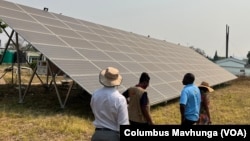Columbus Mavhunga
HARARE, ZIMBABWE — Zimbabwe is working with the International Atomic Energy Agency and Russian investors to establish nuclear energy as part of its efforts to end the country’s chronic power shortages, government officials said Thursday.
The nation has expressed its interest in nuclear power to the IAEA, said Edgar Moyo, minister of energy and power development, and hopes to develop small, modular reactors.
“They have indicated their willingness to take us through paces until we get there,” Moyo told journalists.
Establishing nuclear power is expensive and complex, said Joseph Siegle, the director of research at the Africa Center for Strategic Studies in Washington, which is the reason countries such as South Africa and Egypt have sought Russia’s assistance.
The process is also ripe for corruption, he said, so transparency is critical.
“Most economists would argue that those deals cost far more than are warranted for the benefits that they would provide to their economies and to their societies,” Siegle said, “and so there's a worry that these huge infrastructure projects become a source of corruption, both in the country where it is being built, but also vis-a-vis the state-owned enterprises that the Russians provide to build the plant.
“In the end, it becomes the public in the country that is building the plant that would be responsible for paying off these costs,” he said.
Zimbabwe says its goal is to have 4,000 megawatts of power capacity by 2035 and end years of power cuts that can sometimes last up to 18 hours per day.
Siegle said Zimbabwe’s power needs do not warrant a traditional large-scale nuclear reactor and suggested that the government study the lasting impact of waste disposal.
"[This] has always been a concern with nuclear energy — what you do with the waste, which requires some 10,000 years for the radioactive elements to decay and not pose a health risk to society,” he said.
Nuclear power also heightens security risks, Siegle said.
Gloria Magombo, secretary for energy and power development, said at the media briefing that Zimbabwe aims to increase the use of other renewable energies besides hydropower, given the nation’s recurring droughts.
She mentioned solar, wind and mini-hydro stations.
“We are we are looking at coming in by 2030 with up to about 2,000 megawatts” from those sources, Magombo said.
Zimbabwe's current capacity for power generation is about 2,600 megawatts, according to the government. The actual daily generation is roughly half of that.





Forum